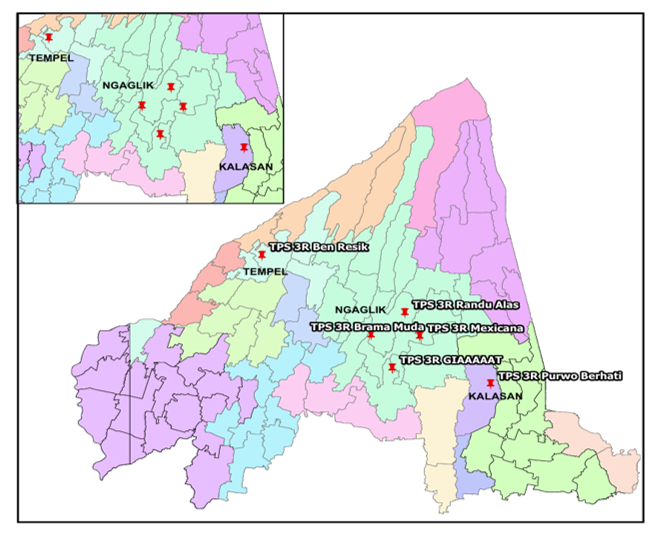Preparation of Sustainability Instruments for Community-Based on Solid Waste Management Programs: A Case Study of TPS3R in Sleman Regency, Yogyakarta
Main Article Content
Khoiria A'fia
Hijrah Purnama Putra
The solid waste management system requires a community component that is directed through Community-Based Solid Waste Management (CBSWM) activities. One of the CBSWM activities in Indonesia is TPS3R (3R Waste Treatment Facility) or MRF (Material Recovery Facility). The fact on the ground was that many TPS3R management systems were not running optimally. This has the potential to hinder the sustainability of the TPS3R program. This sustainability can be assessed through proper instruments that measure program effectiveness. This research aims to develop an instrument for assessing the level of sustainability and experiment with it at TPS3R. The instrument is used to analyze the sustainability of the studied programs to determine which ones are feasible to continue. The instrument consists of 20 indicators, parameters, assessment scales, and weightings that are integrated into five aspects of waste management, including operational, technical, regulatory, community participation, financing, and institutional aspects. The research analysis method applied is the scoring method to assess the level of sustainability in TPS3R. The research was conducted at six TPS3R locations in Sleman Regency Yogyakarta. Experiments with the instrument revealed that each TPS3R received a distinct score and was classified according to the planned level of sustainability. The results of the sustainability level assessment are divided into three statuses: very sustainable, achieved by TPS3R Purwo Berhati with a percentage of 80%. Then, the sustainable status was achieved by TPS3R Brama Muda, TPS3R Mexicana, and TPS3R GIAAAAAT with percentages of 70%, 70%, and 78%, respectively. Finally, the status of fairly sustainable was achieved by TPS3R Ben Resik and TPS3R Randu Alas, at 58% and 57%, respectively. Based on the study's results, this instrument can be utilized in the sustainability assessment of TPS3R.
Alfianto, F. (2017). Analisa Kesesuaian Lahan Untuk Lokasi Pengembangan Permukiman Menggunakan Metode Skoring (Studi Kasus: Surabaya Timur). Institut Teknologi Sepuluh Nopember.
Atmanti, H., Handoyo, R., & Muryani. (2018). Strategy for sustainable solid waste management in Central Java Province, Indonesia. International Journal of Agricultural Science and Research, 4(6), 215–223
Burhanuddin. (2024). Sustainable Waste Management Practice in Indonesia, Sinergi International Journal of Management and Business, Vol 2 No 1, 11-25
Kamulyan, P. (2018). Evaluasi Keberlanjutan Pengelolaan Sistem Penyediaan Air Minum Berbasis Masyarakat di Kota Blitar. Institut Teknologi Sepuluh November.
Latanna, M.D., Gunawan, B., Franco-García, M.L., Bressers, H. (2023). Governance Assessment of Community-Based Waste Reduction Program in Makassar. Sustainability, 15, 14371. https://doi.org/10.3390/su151914371
Lodan, K. T., Salsabila, L., Dompak, T., Rorong, M. J., & Khairina, E. (2022). Key factors influencing Indonesia’s solid waste management maturity (A study of Piyungan Landfill, Yogyakarta). IOP Conference Series: Earth and Environmental Science, 1105, 012046
Putra, H.P. (2025). Mengerti Bumi : Menuju Zero Waste Society yang Berdaya dan Berkelanjutan, Pidato Rapat Senat Milad ke-82 Universitas Islam Indonesia 30 Januari 2025
Putra, H.P., Damanhuri, E., Sembiring, E. (2019). Sektor baru pengelolaan sampah di Indonesia (Studi Kasus di Kota Yogyakarta, Kabupaten Sleman dan Bantul), Jurnal Sains dan Teknologi Lingkungan, Vol 12 No 1, 45-58
Putra, H.P., Damanhuri, E., Sembiring, E. (2020). The role of MRF in Indonesia’s solid waste management system (case study of the Special Region of Yogyakarta, Indonesia), Journal of Material Cycles and Waste Management Vol 22 No 2, 396-404
Rasyid, R. M. A. K., Pambudi, A., & Widyawati, R. (2024). Perbandingan Persepsi Dosen Dan Mahasiswa Universitas AMIKOM Yogyakarta Terhadap Kegunaan LMS WASKITA. Journal of Information System Management (JOISM), 5(2), 134–139.
Sunardi, K. S., & Akliyah, L. S. (2023). Identifikasi Faktor Kurang Berjalannya TPS3R Citepus di Pasawahan Dayeuhkolot Kabupaten Bandung. Jurnal Riset Perencanaan Wilayah dan Kota, 3(2), 159–166.
Zurbrügg, C., Gfrerer, M., Ashadi, H., Brenner, W., & Küper, D. (2012). Determinants of sustainability in solid waste management–the Gianyar Waste Recovery Project in Indonesia. Waste Management, 32(11), 2126–2133
Khoiria A'fia , Islamic University of Indonesia, Indonesia
Department of Environmental Engineering, Islamic University of Indonesia, Yogyakarta, Indonesia
Hijrah Purnama Putra , Islamic University of Indonesia, Indonesia
Department of Environmental Engineering, Islamic University of Indonesia, Yogyakarta, Indonesia








